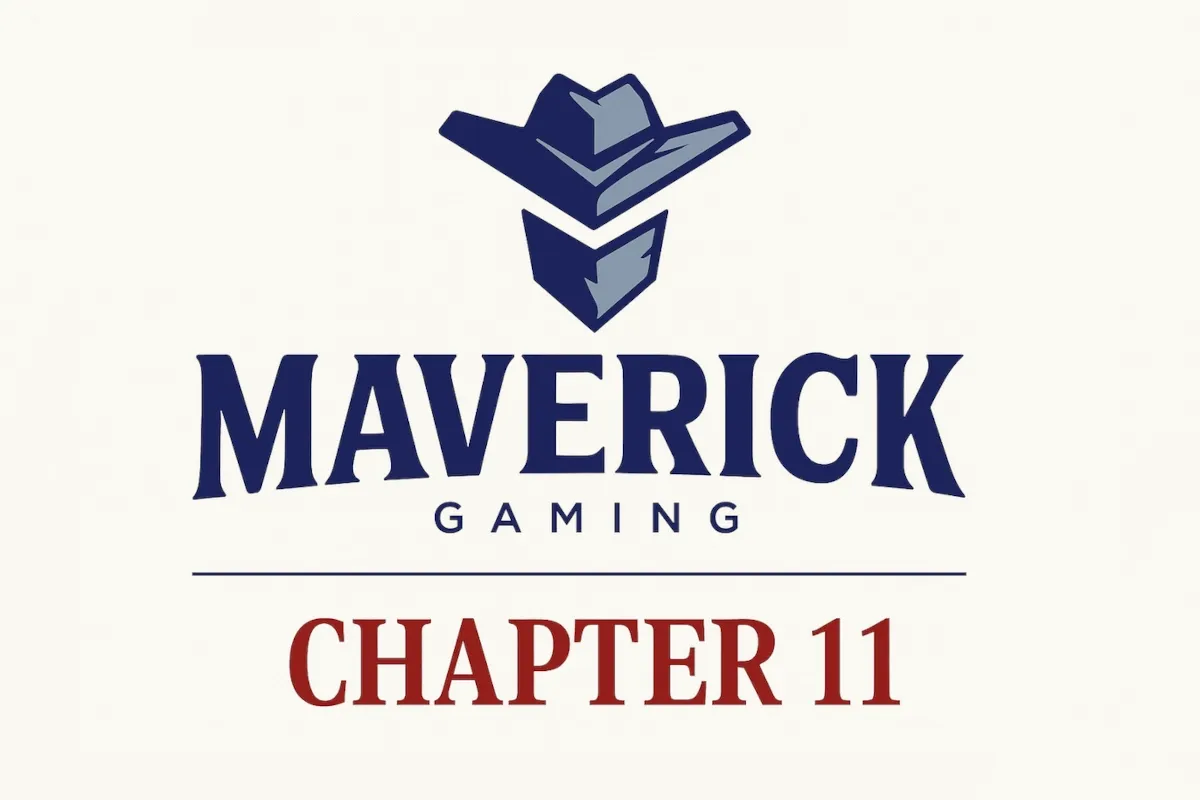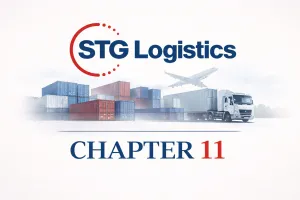Case Summary: Maverick Gaming Chapter 11
Maverick Gaming has filed for Chapter 11 bankruptcy citing competition from tribal casinos, operational misalignments, and broader industry headwinds, supported by $25.5 million in DIP financing and a prearranged restructuring agreement.

Business Description
RunItOneTime LLC (dba Maverick Gaming), along with its Debtor affiliates⁽¹⁾ (collectively, "Maverick" or the "Company"), is a privately held gaming and entertainment company specializing in the acquisition and turnaround of underperforming casino and cardroom properties.
- The Company pursues a strategy of building a portfolio of regional gaming assets and enhancing their profitability through targeted operational enhancements and marketing initiatives.
As of the Petition Date, Maverick operates a portfolio of 26 gaming properties across Washington, Nevada, and Colorado. These properties collectively feature approximately 2,500 slot machines, 320 table games, 1,200 hotel rooms, and 30 restaurants. The Company’s primary operating segments include:
- Washington Card Rooms: Maverick is one of the largest cardroom operators in Washington, with 17 active house-banked cardrooms concentrated in the Seattle area.
- Nevada Casino Hotels: The Company owns five properties in rural Nevada markets, including the Wendover Nugget and Red Garter casinos in West Wendover and three properties in Elko. These locations offer a full suite of gaming options, lodging, and other amenities.
- Colorado Casinos: Maverick operates three casinos in the historic mining towns of Black Hawk and Central City. These smaller-scale casinos primarily cater to day-trip gamblers from Denver.
- EGads! LLC: Acquired in 2020, the Las Vegas-based subsidiary designs custom casino interiors, signage, and themed décor. The unit has become one of the Company’s more profitable segments, with revenue climbing to $33.2 million in 2024 from $22.1 million in 2022. EBITDA more than doubled over that period to $10.6 million.
- Utah Trailways: To drive traffic to its Wendover, NV, casinos, Maverick operates a charter bus service that transports customers from the Salt Lake City area, a crucial link to its Utah customer base.
RunItOneTime LLC and its affiliates filed for Chapter 11 protection on July 14, 2025 (the "Petition Date"), in the U.S. Bankruptcy Court for the Southern District of Texas, reporting $100 million to $500 million in both assets and liabilities.
⁽¹⁾ For a complete list of Debtor entities, see the organizational structure chart below.
Corporate History
Maverick Gaming was founded in 2017 by CEO Eric Persson and COO Justin Beltram, gaming industry veterans with over 30 years of combined experience at Las Vegas Sands, Bellagio, and Marina Bay Sands.
- The Company remains privately held, with Persson controlling roughly 58% through parent entity RunItOneTime HoldCo Inc. Beltram holds about 13%, while the remainder is split among other stakeholders.
- Persson's majority ownership and hands-on leadership as CEO have centralized decision-making, raising governance concerns such as key-person risk and the absence of an independent board, as noted by credit analysts.
Acquisition-Driven Expansion
- 2018–2019: Maverick rapidly entered the Washington and Nevada markets. A key transaction was the 2019 acquisition of then-publicly traded Nevada Gold & Casinos, Inc., which gave Maverick a major foothold with nine cardrooms in Washington. During this period, the Company also acquired its Wendover and Elko, NV, casino portfolios.
- 2019–2020: The Company expanded into Colorado by purchasing three casinos in Black Hawk and Central City. An announced $230 million deal to acquire the Eldorado Shreveport casino in Louisiana was ultimately terminated in mid-2020 due to the COVID-19 pandemic and financing challenges.
- 2020: Maverick diversified its operations by acquiring EGads! LLC, a casino design and fabrication business. This strategic move was intended to vertically integrate branding and renovation capabilities for its growing portfolio.
- 2021–2022: The Company solidified its presence in Washington by acquiring Evergreen Gaming Corp. for approximately $80 million, adding four more cardrooms to its portfolio.
Corporate Organizational Structure

- To comply with varying state gaming laws, Maverick adopted a complex OpCo/PropCo structure. Real estate and facilities are owned or leased by operating subsidiaries (PropCo entities, among the Maverick Debtors), while gaming licenses and operations are held by separate affiliates (OpCo entities) wholly owned by Persson.
- This structure streamlines the licensing process by limiting the number of individuals and entities subject to regulatory suitability reviews. However, it also creates a complex web of interrelated entities, with both PropCo and OpCo affiliates filing as co-Debtors in the jointly administered Chapter 11 cases.
Operations Overview
As of the Petition Date, Maverick maintained operations across three states, with a portfolio consisting of 26 active properties and nine non-operating sites that were previously closed to consolidate gaming revenue. The Company employs approximately 2,900 individuals across its operations.
Washington Card Rooms
The 17 active Washington card rooms are compact venues, typically 5,000–15,000 square feet, offering up to 15 tables each with house-banked games like blackjack and baccarat, player-supported poker, and other card variants, alongside bars and dining options such as grills or Asian cuisine. These neighborhood casinos primarily serve local patrons in the Seattle-Tacoma area and other communities, without slots or electronic gaming restricted to tribal casinos.
Nevada Casino Hotels
The Nevada portfolio includes four hotel-casinos catering to drive-in traffic from Utah and eastern Nevada. The Wendover Nugget and Red Garter properties, located near the Utah border, offer full-service gaming with hotels and on-site sportsbooks. In Elko, the Maverick Hotel & Casino and Gold Country Inn & Casino serve both local patrons and I-80 travelers.
Colorado Casinos
The three casinos in Central City and Black Hawk are modest due to the small-town market. Grand Z Casino & Hotel, the largest, includes 576 slots, 8 table games, and 118 hotel rooms. Dragon Tiger and Z Casino focus on slots without lodging. A gas station/truck stop supports the area.
Sale-Leaseback Financing
To generate capital, Maverick executed sale-leasebacks, introducing fixed rents akin to debt:
- In 2021, land under several Nevada and Colorado casinos was sold to Angelo Gordon affiliates for $93 million, leased back at $8.5 million annually.
- In 2022–2023, multiple Washington and Nevada properties were sold to Blue Owl affiliates for $205 million, leased back at $17.8 million annually. Rent payments to Blue Owl ceased after April 2025, accruing $5.9 million in arrears by filing.
These transactions triggered $26 million in capital gains taxes for 2022–2023, exacerbating liquidity issues amid tightening cash flow.
Prepetition Obligations

Top Unsecured Claims

Events Leading to Bankruptcy
Maverick’s Chapter 11 filing was precipitated by a combination of intense competitive and regulatory pressures, operational missteps, and an overleveraged capital structure that could not withstand a sharp decline in profitability.
COVID-19 Disruption and Operational Headwinds
- Pandemic Impact: The mandatory shutdown of all properties in March 2020 severely impacted revenue. Operations in Washington, the Company’s largest segment, were particularly hard-hit by prolonged closures and restrictive reopening rules that required costly outdoor tent operations and limited customer traffic well into 2021.
- Operational Missteps: In 2022, performance in Colorado suffered due to a series of internal issues, including:
- A botched slot management system upgrade that caused machine downtime and customer frustration.
- An overly generous "free play" promotional campaign that eroded profitability for several months.
- Nearly $1 million in losses from a short-lived and unsuccessful sports betting venture.
- Increased Competition: Maverick faced heightened competition across key markets. In Colorado, the March 2022 expansion of the Monarch Casino Resort Spa in Black Hawk drew away higher-end customers. In Washington, tax-exempt tribal casinos with fewer gaming restrictions ramped up investments and promotions, squeezing Maverick’s smaller, tax-paying cardrooms.
Washington Regulatory and Competitive Pressures
The regulatory environment in Washington proved to be a major obstacle, creating what the Company described as an uneven playing field.
- Failed Legal Challenge: In January 2022, Maverick filed a federal lawsuit challenging Washington’s tribal gaming exclusivity, seeking the right to offer sports betting and other games. The lawsuit was dismissed by a federal court in February 2023, a decision upheld on appeal in December 2024, cementing the restrictive regulatory status quo.
- Regulatory Setbacks: In January 2025, the Washington State Gambling Commission denied Maverick’s petition to create a centralized surveillance center for its cardrooms, a move the Company argued was necessary for cost efficiency. In response, Maverick announced the closure of four Washington locations, citing the burdensome cost of maintaining separate surveillance operations.
- Rising Labor Costs: Local minimum wage ordinances in the Seattle area, particularly in Tukwila, drove a 46% increase in labor costs between 2022 and 2025, far outpacing revenue growth and further straining profitability.
Financial Decline and Debt Defaults
The confluence of these challenges caused a dramatic collapse in financial performance. The Company's adjusted EBITDA plummeted from $52.1 million in 2021 to just $16.5 million in 2023, rendering its debt and lease obligations unsustainable—particularly with 2025 quarterly debt service obligations totaling approximately $9 million, and an additional $9.1 million in capital lease payments, assuming no changes to the capital structure.
- Liquidity Crisis: Rising interest rates and high fixed charges led to significant cash burn. In 2023, a distressed debt repurchase was viewed by S&P as a "selective default," leading to a series of credit actions that culminated in a "D" (default) rating in May 2024.
- Covenant and Payment Defaults: Despite a prior financial restructuring and loosened covenants under the Fourth Amendment to the Prepetition Credit Facility, the Company breached its financial covenants in May 2025. It subsequently missed an interest payment on its term loans and defaulted on its master lease with Blue Owl, triggering default notices from its lenders and lessors.
Restructuring Negotiations and Chapter 11 Filing
After attempts to raise third-party capital failed, Maverick began negotiations with an ad hoc group of its Prepetition Credit Facility (the "Ad Hoc Group") in early 2025.
- Transaction Support Agreement (TSA): On June 25, 2025, Maverick executed a TSA with lenders holding approximately 78% of First Out Term Loans and 70% of Second Out Term Loans. The TSA outlines the terms of a pre-negotiated restructuring to be implemented through Chapter 11.
- Governance Changes: In the lead-up to the filing, Maverick formed a Special Committee comprised of two new independent directors (Lawrence Perkins and Tobias Keller) and a third member designated by the lenders. Crucially, any action by the committee requires the consent of the lender-designated member. The Company also appointed Jeffrey Seery as Chief Restructuring Officer to oversee the process.
- Proposed Restructuring Plan: The TSA contemplates separating Maverick’s assets into three segments for disposition:
- PokerCo (Select Washington Card Rooms): To be sold via a Section 363 sale, with an affiliate of CEO Eric Persson serving as the stalking horse bidder with a $13 million cash offer. PokerCo comprises Aces Poker Lakewood, Aces Poker Mountlake Terrace, Caribbean Casino, and Caribbean Cardroom. If acquired by Persson’s affiliate, 50% of net resale proceeds over five years will be shared with existing lenders.
- LeaseCo (Properties under Blue Owl Lease): To be addressed through a negotiated amendment or other modification of the burdensome Blue Owl Master Lease.
- MainCo (NV/CO Casinos and EGads!): To be sold or reorganized through a debt-for-equity swap, with the prepetition lenders positioned to credit bid their debt and take ownership. MainCo includes the Nevada and Colorado locations, EGads! LLC, and the “Maverick” and “Aces” trademarks and brands.
- DIP Financing: To fund operations through the Chapter 11 process, the Company secured a $25.5 million DIP financing facility from members of the Ad Hoc Group, including $8.5 million in new money.
Initial DIP Budget

Key Parties
- Hunton Andrews Kurth LLP (bankruptcy co-counsel); Latham & Watkins LLP (bankruptcy co-counsel); GLC Advisors & Co., LLC and GLC Securities, LLC (investment banker); Triple P TRS, LLC (financial advisor); Marnell Gaming Management (gaming management consultant); Jeff Seery (chief restructuring officer); Kroll Restructuring Administration LLC (claims agent).
Stay informed on every Chapter 11 bankruptcy case with liabilities exceeding $10 million. Subscribe for free to have our coverage delivered directly to your inbox, and explore our full archive of past summaries.
Subscribers can also opt in to timely filing alerts by updating their email preferences in Account Settings.



